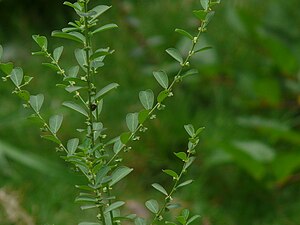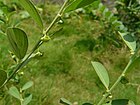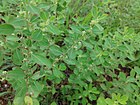Note: This is a project under development. The articles on this wiki are just being initiated and broadly incomplete. You can Help creating new pages.
Difference between revisions of "Phyllanthus maderaspatensis"
(→Parts Used) |
(→References) |
||
| (One intermediate revision by the same user not shown) | |||
| Line 33: | Line 33: | ||
==Identification== | ==Identification== | ||
===Leaf=== | ===Leaf=== | ||
| − | {{Leaf|||}}<ref name="Leaf"/> | + | {{Leaf|Scattered|Obvate-cuneate|Rounded or truncate at apex}}<ref name="Leaf"/> |
===Flower=== | ===Flower=== | ||
| − | {{Flower||||}} | + | {{Flower|Obovate||||Male flowers minute. The female larger and solitory, pedicellate. 6 sepals}} |
===Fruit=== | ===Fruit=== | ||
| − | {{Fruit||||||}} | + | {{Fruit|Capsules||Depressed|Globose||}} |
===Other features=== | ===Other features=== | ||
| Line 68: | Line 68: | ||
<ref name="chemical composition">[https://www.researchgate.net/publication/279699592_Chemical_constituents_of_Phyllanthus_maderaspatensis_Linn Chemical constituents]</ref> | <ref name="chemical composition">[https://www.researchgate.net/publication/279699592_Chemical_constituents_of_Phyllanthus_maderaspatensis_Linn Chemical constituents]</ref> | ||
| − | <ref name="Leaf"> | + | <ref name="Leaf">Kappatagudda - A Repertoire of Medicianal Plants of Gadag by Yashpal Kshirasagar and Sonal Vrishni, Page No. 305 |
| + | </ref> | ||
<ref name="How to plant/cultivate">[http://tropical.theferns.info/viewtropical.php?id=Phyllanthus+maderaspatensis Cultivation]</ref> | <ref name="How to plant/cultivate">[http://tropical.theferns.info/viewtropical.php?id=Phyllanthus+maderaspatensis Cultivation]</ref> | ||
Latest revision as of 17:19, 31 May 2021
Phyllanthus maderaspatensis is an erect to spreading, unbranched to much-branched, annual to perennial plant with stems that can become more or less woody and persist for more than a year. It can grow up to 90cm tall, occasionally to 120cm. The plants are harvested from the wild for local use as a medicine. They are traded locally in market places and are also sold for the commercial production of pharmaceutical products.
Contents
- 1 Uses
- 2 Parts Used
- 3 Chemical Composition
- 4 Common names
- 5 Properties
- 6 Habit
- 7 Identification
- 8 List of Ayurvedic medicine in which the herb is used
- 9 Where to get the saplings
- 10 Mode of Propagation
- 11 How to plant/cultivate
- 12 Commonly seen growing in areas
- 13 Photo Gallery
- 14 References
- 15 External Links
Uses
Toothache, Rheumatism, Headache, Bronchitis, Earache, Ophthalmia, Jaundice.[1]
Parts Used
Decotion of root, Whole plant.
Chemical Composition
It contains n-tetracosane, taraxeryl acetate, ester of β-sitosterol, taraxerol, hexacosane, 32-methyltritriacontanol-1, heptacosanol-14, 11-hydroxyhexacosan-3- one, tetracos-20(cn)-1,18-diol, β-sitosterol and oleana-11,13(18)dienc- 3β,24-diol etc.[2]
Common names
| Language | Common name |
|---|---|
| Kannada | ಮದರಾಸ್ ನೆಲ್ಲಿ Madaraas nelli |
| Hindi | Hajarmani, Kanocha |
| Malayalam | |
| Tamil | Nila-nelli |
| Telugu | Nalla usirika |
| Marathi | Bhuiavali |
| Gujarathi | |
| Punjabi | |
| Kashmiri | |
| Sanskrit | Bhumyaamalaki |
| English | Madras Leaf-Flower |
Properties
Reference: Dravya - Substance, Rasa - Taste, Guna - Qualities, Veerya - Potency, Vipaka - Post-digesion effect, Karma - Pharmacological activity, Prabhava - Therepeutics.
Dravya
Rasa
Guna
Veerya
Vipaka
Karma
Prabhava
Habit
Identification
Leaf
| Kind | Shape | Feature |
|---|---|---|
| Scattered | Obvate-cuneate | Rounded or truncate at apex |
Flower
| Type | Size | Color and composition | Stamen | More information |
|---|---|---|---|---|
| Obovate | Male flowers minute. The female larger and solitory, pedicellate. 6 sepals |
Fruit
| Type | Size | Mass | Appearance | Seeds | More information |
|---|---|---|---|---|---|
| Capsules | Depressed | Globose |
Other features
List of Ayurvedic medicine in which the herb is used
Where to get the saplings
Mode of Propagation
How to plant/cultivate
It grows on a wide variety of soils, usually on heavy clay and alluvial soils of low-altitude river valleys, on river banks and in flood plains.[4]
Commonly seen growing in areas
Deciduous woodland, Wooded savannah, Grassland, On beaches.
Photo Gallery
References
- ↑ Indian Medicinal Plants by C.P.Khare
- ↑ Chemical constituents
- ↑ Kappatagudda - A Repertoire of Medicianal Plants of Gadag by Yashpal Kshirasagar and Sonal Vrishni, Page No. 305
- ↑ Cultivation
External Links
- Ayurvedic Herbs known to be helpful to treat Toothache
- Ayurvedic Herbs known to be helpful to treat Rheumatism
- Ayurvedic Herbs known to be helpful to treat Headache
- Ayurvedic Herbs known to be helpful to treat Bronchitis
- Ayurvedic Herbs known to be helpful to treat Earache
- Ayurvedic Herbs known to be helpful to treat Ophthalmia
- Ayurvedic Herbs known to be helpful to treat Jaundice
- Herbs with Decotion of root used in medicine
- Herbs with Whole plant used in medicine
- Herbs with common name in Kannada
- Herbs with common name in Hindi
- Herbs with common name in Tamil
- Herbs with common name in Telugu
- Herbs with common name in Marathi
- Herbs with common name in Sanskrit
- Herbs with common name in English
- Habit - Perennial
- Index of Plants which can be propagated by Seeds
- Herbs that are commonly seen in the region of Deciduous woodland
- Herbs that are commonly seen in the region of Wooded savannah
- Herbs that are commonly seen in the region of Grassland
- Herbs that are commonly seen in the region of On beaches
- Herbs
- Pages without herbs images



